Garden Maintenance in Turnham Green: Keeping Your Outdoor Space Pristine
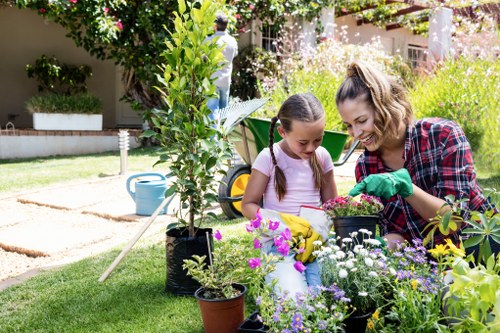
Introduction to Garden Maintenance
Maintaining a beautiful garden in Turnham Green requires dedication, knowledge, and the right resources. Whether you're a seasoned gardener or a novice, understanding the nuances of garden care in this specific locale can make all the difference in achieving a vibrant and healthy outdoor space.
Turnham Green's unique climate and soil conditions influence the types of plants that thrive and the maintenance practices needed. By tailoring your garden maintenance strategies to these local factors, you can ensure your garden remains lush and inviting throughout the year.
In this comprehensive guide, we'll explore essential garden maintenance tips, seasonal tasks, and effective strategies to keep your Turnham Green garden looking its best.
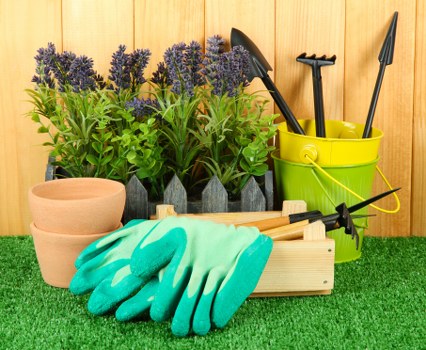
Understanding Turnham Green's Climate and Soil
Climate Considerations
Turnham Green experiences a temperate climate with mild winters and warm summers, making it suitable for a wide variety of plants. However, occasional extremes in temperature and rainfall patterns can pose challenges.
Temperature Trends
Average temperatures range from lows of around 2°C in winter to highs of 25°C in summer. Understanding these temperature fluctuations helps in selecting plants that can withstand local conditions.
Rainfall Patterns
With an annual rainfall of approximately 600mm, it's essential to manage water drainage effectively to prevent root diseases and ensure optimal plant growth.
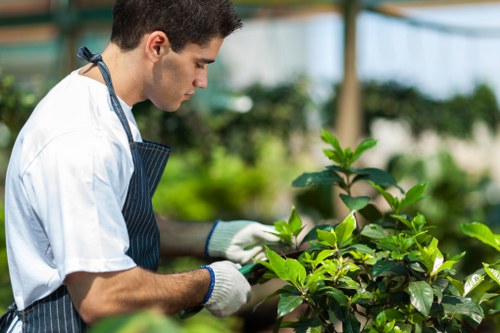
Essential Garden Maintenance Tasks
Pruning and Trimming
Regular pruning is vital for maintaining the shape and health of your plants. It encourages new growth and removes any diseased or dead branches.
Pruning Techniques
Use sharp, clean tools to make precise cuts. Always prune at a 45-degree angle to promote proper healing and reduce the risk of infection.
When to Prune
The best times to prune most plants in Turnham Green are late winter or early spring before new growth begins.
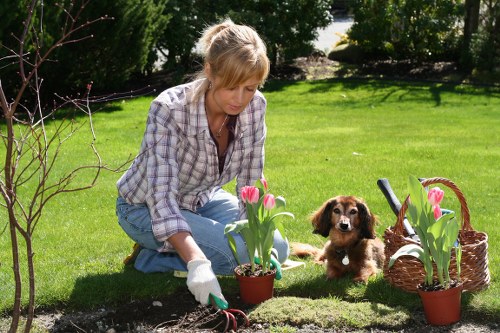
Seasonal Garden Maintenance
Spring Maintenance
Spring is the ideal time to prepare your garden for the growing season. This includes clearing debris, planting new specimens, and fertilizing the soil.
Planting Tips
Choose native plants that are well-suited to Turnham Green's climate. They require less maintenance and are more resistant to local pests and diseases.
Fertilizing Strategies
Use organic fertilizers to enrich the soil without harming beneficial microorganisms. Apply in moderation to avoid nutrient runoff.
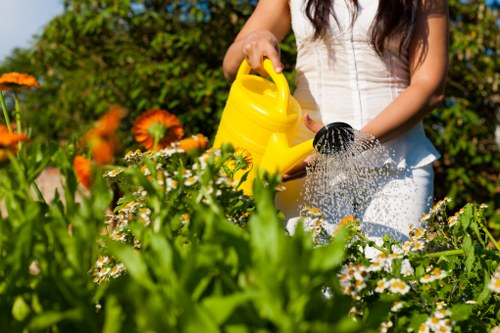
Effective Lawn Care
Mowing Techniques
Regular mowing keeps your lawn healthy and prevents weed growth. Aim to mow at the highest recommended height for your grass type to encourage deeper root systems.
Watering Practices
Water your lawn early in the morning to reduce evaporation and fungal growth. Ensure deep, infrequent watering to promote drought resistance.
Weed Control
Implement a combination of manual removal and targeted herbicide application to manage unwanted weeds without harming desirable plants.
Soil Health and Improvement
Healthy soil is the foundation of a thriving garden. Regularly test your soil to determine its pH level and nutrient content.
Amend your soil with compost or well-rotted manure to improve its structure and fertility. This enhances water retention and provides essential nutrients for plant growth.
Mulching: Apply a layer of mulch around your plants to conserve moisture, suppress weeds, and regulate soil temperature.
Pest and Disease Management
Protecting your garden from pests and diseases is crucial for maintaining plant health. Implement integrated pest management (IPM) strategies to minimize damage while promoting ecological balance.
- Regular Inspection: Monitor your plants regularly for signs of pests or diseases.
- Natural Predators: Encourage beneficial insects like ladybugs and lacewings that prey on common garden pests.
- Biological Controls: Use biological pesticides, such as neem oil, to target specific pests without harming other organisms.
Choosing the Right Plants for Turnham Green
Selecting plants that are well-suited to the local environment reduces maintenance efforts and increases the likelihood of a successful garden.
- Perennials: Plants like lavender and peonies offer long-term beauty with minimal upkeep.
- Annuals: Seasonal blooms such as marigolds and petunias add vibrant colors but require more frequent planting.
- Shrubs and Trees: Incorporate a mix of evergreen and deciduous varieties to provide year-round structure and interest.
Efficient Irrigation Systems
Implementing an efficient irrigation system ensures your plants receive adequate water without wastage.
Drip Irrigation
Drip systems deliver water directly to the plant roots, reducing evaporation and runoff.
Automatic Timers
Using timers can help maintain consistent watering schedules, even when you're away.
Rainwater Harvesting
Collecting rainwater provides a sustainable water source for your garden, especially during dry periods.
Hardscaping and Garden Structures
Incorporate hardscape elements like pathways, patios, and garden sheds to enhance the functionality and aesthetics of your outdoor space.
- Pathways: Use materials like gravel, stone, or brick to create inviting walkways.
- Patios: Designate areas for outdoor seating and entertainment.
- Garden Sheds: Provide storage solutions for tools and equipment, keeping your garden organized.
Sustainable Gardening Practices
Adopting sustainable practices not only benefits the environment but also enhances the resilience of your garden.
Composting
Recycling garden waste through composting returns valuable nutrients to the soil, reducing the need for chemical fertilizers.
Native Plant Selection
Choosing native species supports local ecosystems and requires less water and maintenance.
Organic Gardening
Avoid synthetic chemicals by utilizing organic methods for pest control and fertilization.
Lighting and Garden Ambiance
Proper lighting enhances the beauty of your garden while providing safety and extending the usability of outdoor spaces into the evening.
- Path Lighting: Illuminate walkways to prevent accidents and guide guests.
- Accent Lighting: Highlight focal points like trees, sculptures, or water features.
- Ambient Lighting: Create a warm atmosphere with string lights or lanterns for outdoor gatherings.
Maintaining Garden Tools and Equipment
Proper care of your gardening tools extends their lifespan and ensures they function effectively.
Cleaning and Storage
After each use, clean your tools to remove dirt and debris. Store them in a dry place to prevent rust and damage.
Sharpening Blades
Regularly sharpen blades to maintain their cutting efficiency, which is essential for tasks like pruning and mowing.
Repair and Replacement
Inspect tools for wear and tear, repairing or replacing parts as needed to keep them in optimal condition.
Enhancing Garden Biodiversity
A diverse garden supports various forms of wildlife, promoting a balanced ecosystem.
Attracting Pollinators
Plant flowers that attract bees, butterflies, and other pollinators to improve plant reproduction and overall garden health.
Creating Habitat
Incorporate elements like birdhouses, bat boxes, and insect hotels to provide shelter for beneficial species.
Encouraging Soil Health
Diverse plant species contribute to richer soil biodiversity, enhancing nutrient cycling and plant resilience.
Budget-Friendly Garden Maintenance
Maintaining a beautiful garden doesn't have to break the bank. Implementing cost-effective strategies can help you achieve your garden goals within your budget.
- DIY Projects: Build your own garden structures or compost bins to save on costs.
- Seasonal Sales: Purchase plants and tools during off-peak seasons to take advantage of discounts.
- Reuse and Recycle: Repurpose materials for garden projects, reducing waste and expenses.
Professional Garden Maintenance Services
While DIY maintenance is rewarding, sometimes enlisting professional help can ensure your garden receives the expertise it deserves.
Benefits of Hiring Professionals
Professional gardeners bring specialized knowledge, access to quality tools, and efficient maintenance practices that can enhance your garden's health and appearance.
Services Offered
From regular lawn care and pruning to landscape design and pest management, professional services cover a wide range of garden maintenance needs.
Choosing the Right Service
Research local companies, check reviews, and request quotes to find a garden maintenance service that aligns with your requirements and budget.
Common Garden Maintenance Mistakes to Avoid
Avoiding common pitfalls can save time, resources, and frustration, ensuring your garden remains healthy and beautiful.
- Overwatering: Excessive watering can lead to root rot and fungal diseases.
- Neglecting Soil Health: Ignoring soil conditions can result in poor plant growth and vulnerability to pests.
- Poor Pruning Practices: Incorrect pruning can damage plants and inhibit their natural growth.
Innovative Garden Maintenance Tools and Technology
Embracing modern tools and technology can streamline your garden maintenance tasks, making them more efficient and effective.
Smart Irrigation Systems
Automated irrigation systems with weather-based controllers adjust watering schedules based on current conditions, conserving water and ensuring optimal plant hydration.
Robotic Lawn Mowers
Robotic mowers maintain your lawn with minimal effort, providing consistent cutting and reducing the need for manual mowing.
Garden Management Apps
Utilize mobile apps to plan your garden layout, track plant growth, and schedule maintenance tasks, keeping your garden organized and thriving.
Conclusion
Effective garden maintenance in Turnham Green involves understanding local conditions, implementing best practices, and staying committed to regular care. By following the strategies outlined in this guide, you can cultivate a beautiful and sustainable garden that enhances your home's appeal and provides a peaceful retreat.
Whether you choose to undertake maintenance tasks yourself or enlist professional help, investing time and effort into your garden will yield rewarding results for years to come.
Ready to transform your garden? Contact us today or book your service now to get started on creating the garden of your dreams in Turnham Green!